Android vs iOS: Know The Difference
Android and iOS are operating systems for mobile technologies like smartphones and tablets. Whether you are a developer or user, it is important to know the difference between them. It will help you decide which one to choose according to your requirement. Before we get to the differences, let us first understand them separately.
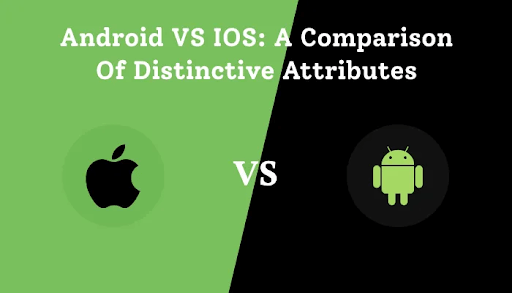 |
Android - It is a mobile operating system that is owned by Google. It is based on the modified version of the Linux Kernel and has other open-source software. It finds usage in touchscreen mobile devices like tablets and smartphones. Google has developed it using C, C++, Java, and other languages. The first version was launched in 2008, and today, it is the most used operating system in the world.
iOS - It is a mobile operating system created and developed by Apple Inc. You will find iOS in Apple mobile devices like iPod and iPhone. It is a Unix-like operating system and is based on Darwin's (BSD) operating system. It is the second most popular operating system after Android. It is developed using languages like C, C++, Objective C, assembly language, and Swift. The iOS was launched in 2007. There are a lot of options available for iPhone app development and you can readily hire an iPhone app developer from the INDIA.
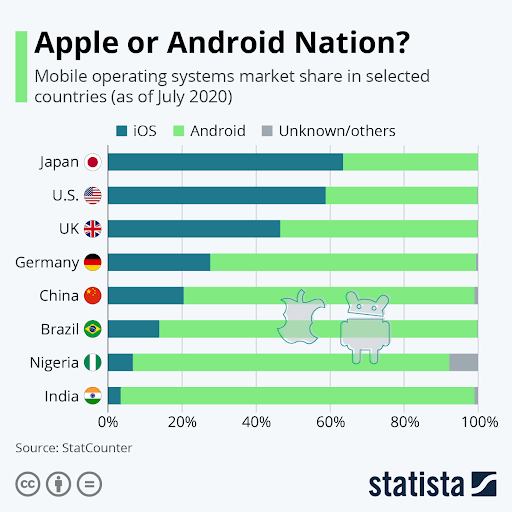 |
Let us now move to the differences and understand the key differences between the two. Below are the top 10 differences between Android and iOS:
1. Development & Programming Languages - From the technical front, both are completely different. They use different programming languages, testing approaches, etc.
Java and Kotlin are the main languages used to build Android apps, while Swift is used to build iOS apps.
In terms of programming languages, Swift makes iOS app development easier and quicker than Android app development since it requires writing less code and therefore, iOS development leads to quicker results. Because Android is open-source, it can, however, be used by other languages, including C/C++, but at a limited scale.
2. Development Environment - Android developers use Android Studio, a tool launched by Google in 2013. The development environment has cross-platform support, a wide range of development, high readability, and debugging features.
iOS developers rely on a proprietary XCode tool backed by Apple that provides bug fixing tools and supports a complete range of iOS devices. Which is better is a difficult question to answer. It depends on the developers' choice of what features best suit them.
3. Customization - While it is easier to learn iOS but when it comes to customization capacity, Android has a vast scope. You would have felt the difference if you had used both operating systems. With Android, you will see new updates more frequently compared to iOS.
From the home screen, Android phones have always offered users more customization options than iOS does. Android phones can sport widgets like calendar boxes and weather icons, while iPhones rely on icons lined up in regimented rows and columns.
4. Cost of creating mobile Apps - The general notion among developers and businesses is that iOS apps are more expensive to develop. However, it is not always the case. Android development becomes challenging with so many different screen sizes that additional efforts have to be put in by resources to make it compatible with all screen sizes. However, that is not the case with iOS app development.
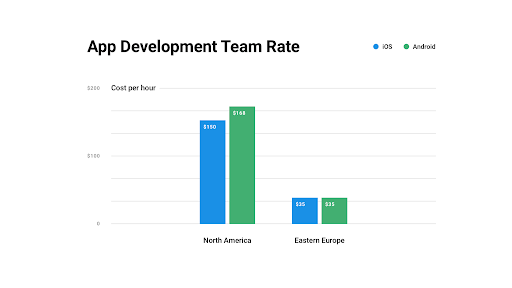 |
5. System-specific design - Both use different design philosophies, and the difference lies in the architectural organization and navigation. Android apps are developed using partitions - a coding team will have to break the app down into activities and fragments. You can think of an activity as one app screen. If a developer has a project on multiple screens, he will end up managing dozens of activities.
iOS apps rely on view controllers. Basically, view controllers act as the foundation of your application's internal structure. There are a few types of such view controllers used for app development - tab, split view controllers, page view, and so on. A view controller can either control the entire screen or one of its parts. A developer can manage controllers in a number of ways. They can either write them in code or organize images in a storyboard and store it as an XML file.
6. App Design - Both iOS and Android have a very different schools of thought when it comes to app designing. The iOS developer shall follow the Human Interface Guidelines guidebook while for Android, the developer will have to adhere to Material Design for guidelines. For iOS, the design has a lower priority than the content of the app. Hence, developers are advised to have clarity and broad use of white space.
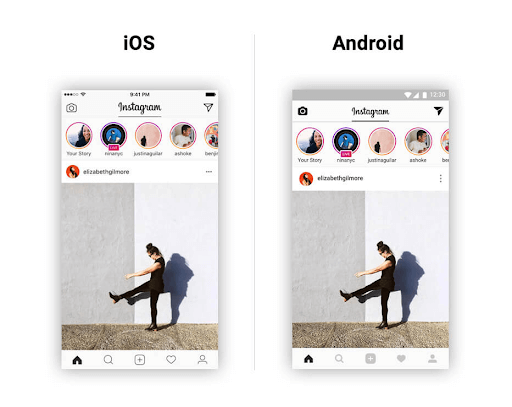 |
The application design should convey a feeling of depth and be multi-layered. The android design comes from real-world inspiration. The two defining factors in Android app designs are color and motion. Android developers use a broader range of tools like light, motions, and color changes.
7. Exclusive Features - There are some exclusive features in both of them. For iOS, exclusive features include iMessage (handles both SMS and Apple supported chat), Airdrop, Share WiFi passwords, etc. The exclusive features of Android include customization of the home screen, file management, expandable storage, multiple users, and guest accounts.
8. The number of free apps - The iOS main or target user base is located in the US. In the US, users are more than willing to pay for a mobile app. On the other hand, Android is popular in the markets where the paid apps are not popular, and users mostly don't prefer paid apps. For both platforms, a developer has to share 30% of the revenue with the platform. AppStore users will be more engaged than Google Play visitors if you expect an app user to pay right before downloading your product.
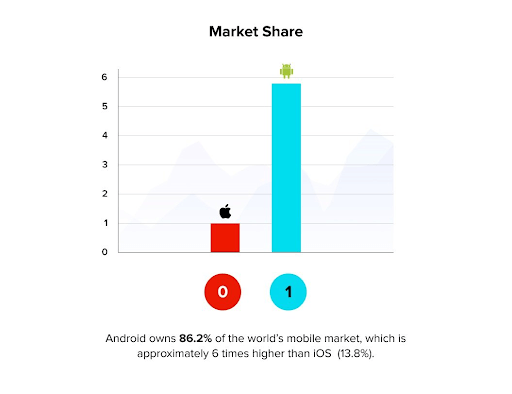 |
9. Security and Approval time- When it comes to security, the majority of users trust iOS as there are no chances that it will get disturbed by malware. However, with Android, security is a concern since the Android devices are not running with the updated security patched software. Both iOS and Android are also vulnerable to bugs like phones crashing when playing a specific video, which is a type of software bug that has affected both.
When you put your app up for approval, Apple usually takes 24-28 hours to approve your app while Google approves your app in PlayStore in a couple of hours. In both cases, the app is manually reviewed by the respective team.
10. Return on Investment - When you put your app in different stores there are three ways to earn from it - an ad-based model, a paid application, and in-app purchases. For In-app purchases, Android leads in terms of the number of purchases with 22% against 17%. For paid applications, iOS has a higher percentage. Out of the total iOS app, 11% are paid, while for Android only 7% are paid. Most iOS apps do not use paid ads, while Android apps are ad-heavy.
Conclusion
From the above discussion, it must be clear to you that both iOS and Android have significant differences, and there is no clear winner between them. If you know your requirements clearly and what you are trying to achieve, you can conclude easily.
|
Article Contributed By :
|
|

|
|
|
Harikrishna Kundariya, a marketer, developer, IoT, ChatBot & Blockchain savvy, designer, co-founder, Director of eSparkBiz Technologies . His 10+ experience enables him to provide digital solutions to new start-ups based on IoT and ChatBot. |
|